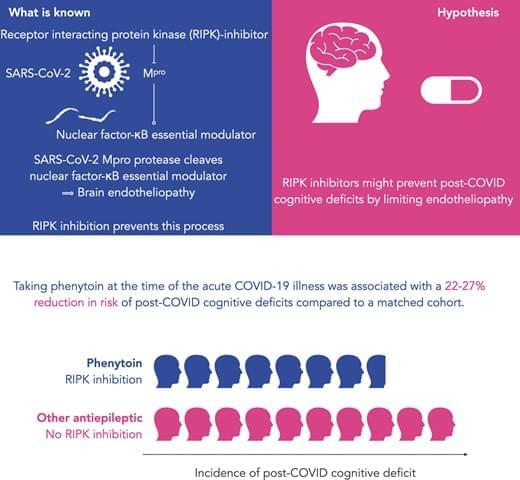A proportion of patients experience long-lasting symptoms in the weeks and months after a diagnosis of COVID-19. 1–3 Of those symptoms, cognitive impairment (also referred to as ‘brain fog’) is particularly worrisome: it is one of the most common, 4, 5 can affect those with even relatively mild acute COVID-19 illness 1, 5 and results in the inability to work for many affected patients. 3 While emerging research is starting to characterize the clinical presentation of post-COVID cognitive deficits, 6 its pathogenesis remains elusive. Identifying therapeutic targets is critical to reducing the burden of this COVID-19 complication.
Endotheliopathy has been hypothesized as one potential mechanism underlying post-COVID cognitive deficits. 7 According to recent research, microvascular brain pathology following COVID-19 can be caused by severe acute respiratory syndrome coronavirus 2 (SARS-CoV-2) main protease Mpro cleaving nuclear factor-κB essential modulator thus inducing the death of brain endothelial cells. 8 The same study showed that pharmacologically inhibiting receptor-interacting protein kinase (RIPK) signaling prevents the Mpro-induced microvascular pathology. 8
This research leads to the following hypothesis: exposure to a pharmacological inhibitor of RIPK signaling at the time of COVID-19 infection reduces the risk of post-COVID cognitive deficits. In this study, we tested this hypothesis using a retrospective cohort study based on electronic health records (EHRs) data. While many pharmacological agents inhibit RIPK signaling, 9 most are only used in very rare clinical scenarios (e.g. sunitinib for the treatment of advanced renal cell carcinoma or pancreatic neuroendocrine tumors). The exception is phenytoin which is used as an anti-epileptic drug and which, among its other effects, is a RIPK1 inhibitor protecting against necroptosis. 10, 11 In this study, we compared the incidence of post-COVID cognitive deficits between patients exposed to phenytoin and matched cohorts of patients exposed to other anti-epileptic drugs at the time of their COVID-19 diagnosis.
